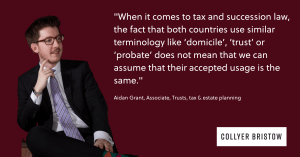- International trusts, tax and estate planning

Longer Reads
Election 2024: Domicile, Inheritance Tax, and change promised by the new Labour government
One of the widely trailed promises in Labour’s election manifesto was the commitment to “clos[e] further non-dom tax loopholes…”. What does this mean and what do we know so far?
3 minute read
Published 10 July 2024
Key information
- Specialisms
- Private Wealth
Labour won a substantial majority in the General Election on Thursday 4 July, meaning that the new administration led by Sir Kier Starmer has an electoral mandate to carry out in full its programme for government. One of the widely trailed promises in Labour’s election manifesto was the commitment to “clos[e] further non-dom tax loopholes…”, which, together with other unspecified reductions in tax avoidance, is projected to raise £5.23bn, which has been allocated to specified spending priorities.
Many people are sceptical that the tax changes promised will deliver the hoped-for revenue, but Labour’s resolve to carry through these promises into legislation ought not to be doubted. Part of the issue was Labour’s concerted attempt to keep the details of its tax policies opaque until after the election (presumably, to avoid ‘frightening the horses’): this makes it all-but impossible for experts to analyse the proposals and their likely effects, both on the UK economy as a whole, and on defined groups of taxpayers.
So what do we know?
We know from our clients that many people who were previously resident – but not domiciled – in the UK have already left, or are in the process of leaving, ahead of the enactment of these reforms. But what of those who remain, and of others who wish to live and work in the UK but are concerned about the uncertainty inevitably arising from Labour’s half-articulated plans?
It will be very easy for the government to change many “non-dom” tax rules – and, indeed, both Labour and the Conservatives had promised to do so. It would, for example, be straightforward to say, as Labour has done, that the current “non-dom” arrangements will be replaced with “a modern scheme for people genuinely in the country for a short period.” Of course, there is already a statutory “deemed-domicile” status, which taxes a non-dom’s worldwide estate to Inheritance (IHT), and which prevents them from claiming the preferential “remittance basis” of taxation, which enables them to shelter non-UK income/gains from UK tax (unless brought (‘remitted’) to the UK). It would be easy – and probably relatively uncontroversial – to update those provisions, perhaps in the way that the old rules on tax residence were reformed with the Statutory Residence Test in 2013.
But Labour’s manifesto goes further than this, saying “We will end the use of offshore trusts to avoid inheritance tax so that everyone who makes their home here in the UK pays their taxes here.” Unlike reform of the “deemed-domicile” rules, changing the long-established “excluded property” rules, which form a fundamental constituent part of the IHT regime, for example, is much more difficult. Indeed, it is unlikely to be possible to put this plan into action without doing major damage to the whole scheme of IHT, and without significant and undesired knock-on effects on other aspects of the IHT code. It is this part of Labour’s manifesto which is causing most concern among those “non-doms” who are still resident in the UK and their advisers.
So-called “excluded property trusts” – typically, trusts created by people who are not domiciled in the UK – have long been a normal part of tax planning for those who can make use of them. Essentially, they allow such people to shelter from UK tax their non-UK assets. However, standard anti-avoidance rules already in existence provide that as soon as any benefit from an excluded property trust is received in the UK, it is taxable on the recipient to either income tax or Capital Gains Tax (CGT). It is therefore an over-simplification to suggest that excluded property trusts enable the widespread avoidance of UK taxation: what they do is to put all residents of the UK – both “non-doms” and those domiciled here – in materially the same position as regards wealth enjoyed in the UK, but to ensure that “non-doms’” wealth outside the UK is not charged to tax here.
Because of the lack of clarity in Labour’s plans, it is not clear whether the new rules on excluded property trusts will only apply to new structures put in place after the reforms become law (to which there could be no principled objection), or whether they would also apply to all existing structures, irrespective of when or by whom they were created. If Labour choose to do the latter, this would be reminiscent of the widely-criticised “loan charge” reforms, which retrospectively imposed a charge to tax on unsuspecting people who benefitted under arrangements which had been put in place long before the new rules were enacted. That would be a source of significant concern, and almost certainly litigation.
When will we know more?
It is unlikely that Labour will materially clarify their plans between now and the Autumn Budget on Wednesday 30th October 2024, which leaves the remaining non-doms in the UK and others hoping to join them in a state of limbo. There is little that affected people can do between now and the Budget other than watch and wait. We do not presently recommend wholesale restructuring of existing excluded property trust arrangements. Non-doms moving to the UK will need carefully to consider whether to put in place any new trust(s) before the predicted new laws take effect: circumstances will differ for each client, and there are no “one-size-fits-all” arrangements: bespoke advice is needed in every case.
Collyer Bristow’s tax team is alert to the issues for our clients and potential clients arising from Labour’s manifesto commitments, and we are continually refining our thoughts on them. We would be very happy to review your structures and to advise you on any prudent planning, and to discuss with you the potential impact of Labour’s plans.
Related content
Longer Reads
Election 2024: Domicile, Inheritance Tax, and change promised by the new Labour government
One of the widely trailed promises in Labour’s election manifesto was the commitment to “clos[e] further non-dom tax loopholes…”. What does this mean and what do we know so far?
Published 10 July 2024
Associated sectors / services
Authors
Labour won a substantial majority in the General Election on Thursday 4 July, meaning that the new administration led by Sir Kier Starmer has an electoral mandate to carry out in full its programme for government. One of the widely trailed promises in Labour’s election manifesto was the commitment to “clos[e] further non-dom tax loopholes…”, which, together with other unspecified reductions in tax avoidance, is projected to raise £5.23bn, which has been allocated to specified spending priorities.
Many people are sceptical that the tax changes promised will deliver the hoped-for revenue, but Labour’s resolve to carry through these promises into legislation ought not to be doubted. Part of the issue was Labour’s concerted attempt to keep the details of its tax policies opaque until after the election (presumably, to avoid ‘frightening the horses’): this makes it all-but impossible for experts to analyse the proposals and their likely effects, both on the UK economy as a whole, and on defined groups of taxpayers.
So what do we know?
We know from our clients that many people who were previously resident – but not domiciled – in the UK have already left, or are in the process of leaving, ahead of the enactment of these reforms. But what of those who remain, and of others who wish to live and work in the UK but are concerned about the uncertainty inevitably arising from Labour’s half-articulated plans?
It will be very easy for the government to change many “non-dom” tax rules – and, indeed, both Labour and the Conservatives had promised to do so. It would, for example, be straightforward to say, as Labour has done, that the current “non-dom” arrangements will be replaced with “a modern scheme for people genuinely in the country for a short period.” Of course, there is already a statutory “deemed-domicile” status, which taxes a non-dom’s worldwide estate to Inheritance (IHT), and which prevents them from claiming the preferential “remittance basis” of taxation, which enables them to shelter non-UK income/gains from UK tax (unless brought (‘remitted’) to the UK). It would be easy – and probably relatively uncontroversial – to update those provisions, perhaps in the way that the old rules on tax residence were reformed with the Statutory Residence Test in 2013.
But Labour’s manifesto goes further than this, saying “We will end the use of offshore trusts to avoid inheritance tax so that everyone who makes their home here in the UK pays their taxes here.” Unlike reform of the “deemed-domicile” rules, changing the long-established “excluded property” rules, which form a fundamental constituent part of the IHT regime, for example, is much more difficult. Indeed, it is unlikely to be possible to put this plan into action without doing major damage to the whole scheme of IHT, and without significant and undesired knock-on effects on other aspects of the IHT code. It is this part of Labour’s manifesto which is causing most concern among those “non-doms” who are still resident in the UK and their advisers.
So-called “excluded property trusts” – typically, trusts created by people who are not domiciled in the UK – have long been a normal part of tax planning for those who can make use of them. Essentially, they allow such people to shelter from UK tax their non-UK assets. However, standard anti-avoidance rules already in existence provide that as soon as any benefit from an excluded property trust is received in the UK, it is taxable on the recipient to either income tax or Capital Gains Tax (CGT). It is therefore an over-simplification to suggest that excluded property trusts enable the widespread avoidance of UK taxation: what they do is to put all residents of the UK – both “non-doms” and those domiciled here – in materially the same position as regards wealth enjoyed in the UK, but to ensure that “non-doms’” wealth outside the UK is not charged to tax here.
Because of the lack of clarity in Labour’s plans, it is not clear whether the new rules on excluded property trusts will only apply to new structures put in place after the reforms become law (to which there could be no principled objection), or whether they would also apply to all existing structures, irrespective of when or by whom they were created. If Labour choose to do the latter, this would be reminiscent of the widely-criticised “loan charge” reforms, which retrospectively imposed a charge to tax on unsuspecting people who benefitted under arrangements which had been put in place long before the new rules were enacted. That would be a source of significant concern, and almost certainly litigation.
When will we know more?
It is unlikely that Labour will materially clarify their plans between now and the Autumn Budget on Wednesday 30th October 2024, which leaves the remaining non-doms in the UK and others hoping to join them in a state of limbo. There is little that affected people can do between now and the Budget other than watch and wait. We do not presently recommend wholesale restructuring of existing excluded property trust arrangements. Non-doms moving to the UK will need carefully to consider whether to put in place any new trust(s) before the predicted new laws take effect: circumstances will differ for each client, and there are no “one-size-fits-all” arrangements: bespoke advice is needed in every case.
Collyer Bristow’s tax team is alert to the issues for our clients and potential clients arising from Labour’s manifesto commitments, and we are continually refining our thoughts on them. We would be very happy to review your structures and to advise you on any prudent planning, and to discuss with you the potential impact of Labour’s plans.
Associated sectors / services
- International trusts, tax and estate planning
Authors
Need some more information? Make an enquiry below.
Subscribe
Please add your details and your areas of interest below
Article contributor
James
AustenPartner
Specialising in UK trusts, tax & estate planning, Private wealth, Tax disputes & investigations and Trusts & Inheritance disputes
Enjoy reading our articles? why not subscribe to notifications so you’ll never miss one?
Subscribe to our articlesMessage us on WhatsApp (calling not available)
Please note that Collyer Bristow provides this service during office hours for general information and enquiries only and that no legal or other professional advice will be provided over the WhatsApp platform. Please also note that if you choose to use this platform your personal data is likely to be processed outside the UK and EEA, including in the US. Appropriate legal or other professional opinion should be taken before taking or omitting to take any action in respect of any specific problem. Collyer Bristow LLP accepts no liability for any loss or damage which may arise from reliance on information provided. All information will be deleted immediately upon completion of a conversation.
Close













































